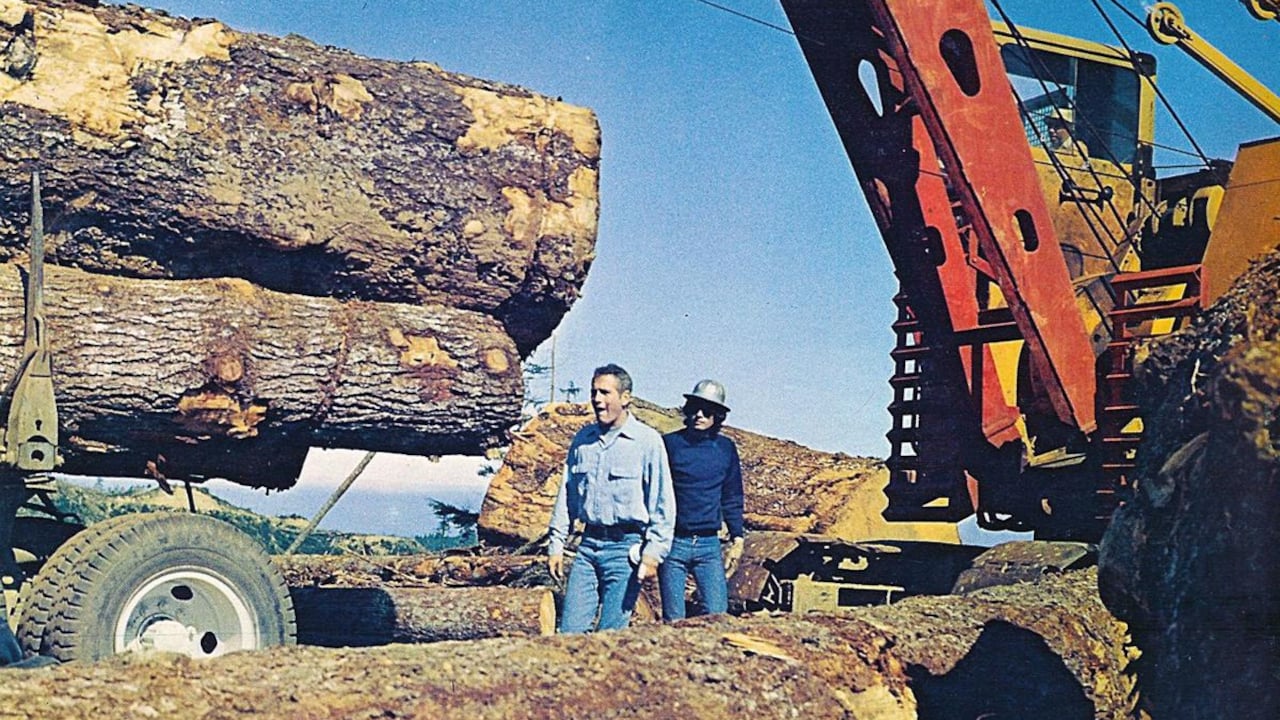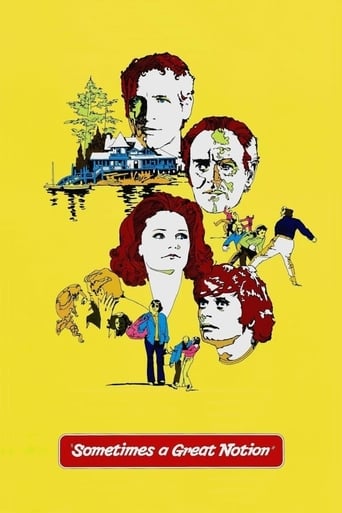

I read a trivia question the other day, asking what was the most dangerous job in the world, or something to that effect. It was a multiple choice question, and I instantly picked the correct answer, because I'd seen the movie Sometimes a Great Notion.This Paul Newman movie is about a bunch of men known as loggers. They chop down enormous, mighty trees for a living. Environmentalists, feel free to skip this movie. The movie alternates between extremely long, boring scenes of tree chopping, and a family quarrel. Paul Newman and Henry Fonda disagree on how to run the family business, and Lee Remick is bored being left home alone all the time, and Michael Sarrazin, the wayward brother, comes home to really make a mess of things! All in all, it's an advertisement to not be a logger. Chopping down trees is extremely dangerous, and it'll make your unhappy wife take notice of your brother.It's a little boring, in a 1970s way, but it's not the worst movie in the world. I just hope they didn't chop down a bunch of real trees during the making of the movie, but the scenes looked so lifelike, I'd be surprised if they didn't.
... View MoreIn these straightened times, the story of a whole town going broke chimes. This is a very gritty worthy film in a similar vein to Five Easy Pieces with Jack Nicholson exposing the underbelly of The American Dream, and reflecting the disillusionment of the American People, five years before the end of the Vietnam War...Think of two lumberjacks and a logjam in a river and (in the UK at least) the Berocca advertisement when they dance a jig on a rolling log probably springs to mind.Let's travel the full spectrum from jollity to tragedy.Hank and Joe Ben Stamper are trying to free a logjam, and Joe Ben falls foul of a log that turns trapping him under the water. Hank tries to save his younger brother by taking breaths and passing them mouth-to- mouth under water. Now given that these are Yosemite Sam types, rootin' tootin' Oregonites, this desperate act of brotherly love strikes the trapped Joe Ben as hilarious... and he begins, to laugh, gulps water... and his brother is forced to watch him drown helpless... and we're forced to watch Hank watch Joe Ben die.The brutal intimacy of this scene set against the scale of the American landscape also forces us to share Hank's sense of helplessness and loss.There are films that we only watch once; not because they're not worthy of watching again... simply because they have moments that scar our sensibilities...
... View MoreThis film was made at the peak of Paul Newman's career, when he was young, handsome, and had the ways that made him a star. It's a good movie about a family of tough-as-nails Oregon loggers and it has a somewhat famous gritty scene where Richard Jaeckel --- normally the heartless rat in other films --- finds his brother hopelessly trapped under a log-slide and he sticks by his brother's side both knowing the rising tide is coming.This movie was doomed by its run-along title and the equally bad second title, Never Give an Inch, when a two word noun-driven title would have assured easy public recognition. Where does that title come from anyway? The Bible? Ben Franklin? The Book of Common Prayer? No, no, and no. It comes from the lyrics of one of the greatest blues songs ever written, "Irene, Goodnight." The final verse goes: Sometimes I live in the country, Sometimes I live in the town, Sometimes I take a great notion, To jump in the river and drown.
... View MoreUnfortunately, as much as I love Paul Newman as an actor, the movie version of Ken Kesey's incredible book could have used a more seasoned director for its translation to the big screen. The perfect cast (the book even mentions Hank Stamper as looking like a muscular Paul Newman!), and some great performances (Fonda, Jaeckel, Remick), but the story just doesn't come across on film the way it should. I remember the first time I saw this movie was in the late 70's on TV (Portland's KPTV-12). It was so chopped-up for television that the story, character motivations, and ending made no sense at all to me. I loved Kesey's book "Cookoo's Nest" so read the novel of "Sometimes" to try to make some sense of what the story was all about. The book was an amazingly nuanced work of fiction with a great deal of depth and under-story (reading between the lines); none of which I saw on the TV screening. I later rented the video but even with the unedited version of the film, I found the story very lacking and barely comprehensive. I've recently watched the rental again (2005) and found more in the film than I had remembered, but I still feel that unless you've read the book, you can't truly understand what this movie and the character motivations are all about. They're just barely eluded to in the film version. In spite of all that, it's still a worthwhile movie to watch. If nothing else, it chronicles some great, authentic-looking logging footage. If you can, however, read the novel first and then catch the film. Also, if you ever make it to Newport, Oregon, visit the harbor bar "Bay Haven" where the scenes for the "Snag" were filmed. Tell them the old bartender from the "Embarcadero" sent you. ;-)
... View More